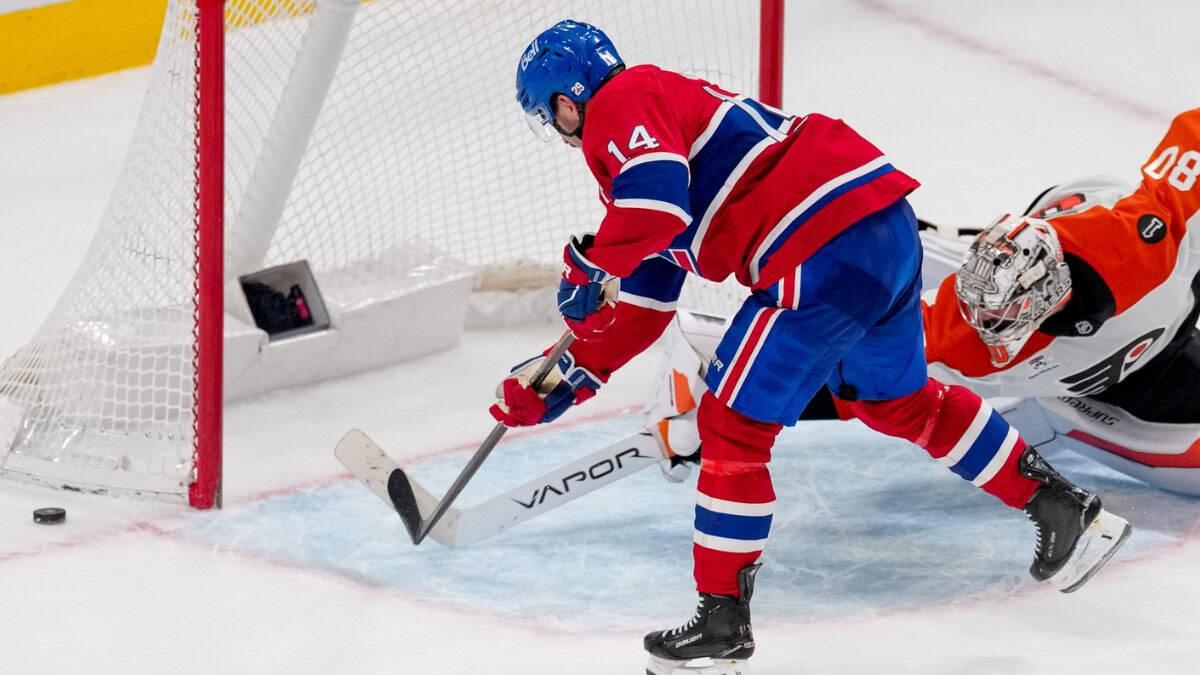
At the Bell Centre, the game crackled to life almost immediately. Within minutes of the opening face-off, the action was fast, physical, and unmistakably intense.
The Flyers surged ahead, the Canadiens mounted a furious comeback, and after two wild hours, everything hinged on a shootout. In the end, the night belonged to the team that held its nerve.
A Blazing Start
From the moment the puck dropped, it felt like the Flyers meant business. At 1:56 into the game, Bobby Brink redirected a Travis Sanheim shot past Montréal goaltender Sam Montembeault, and the 1-0 lead was on.
What followed next was astonishing: By 7:07 of the first period, the Flyers were up 2-0 when Trevor Zegras executed a behind-the-back pass to Cam York on a 5-on-3 power-play, and York buried his first of the season. Only 43 seconds later, Brink grabbed a rebound and fired it home to put the Flyers up 3-0. All within eight minutes.
As I looked around the arena, the Flyers fans, scarce but vocal in rival territory, were roaring. The Canadiens looked stunned. Shots at the end of the period were 12-2 in favour of Philadelphia.
Philadelphia set the pace early, controlling the game’s momentum. They came out hungry, executed on special teams, and forced Montréal into a reaction mode.
The Collapse
But hockey is a game of swings. The second period began with a flicker of hope for the Canadiens that spread into flame. At 3:12, Kirby Dach cleaned up a carom off the end boards and beat Vladar to make it 3-1. One minute later, on the power play, Ivan Demidov found Nick Suzuki with a one-timer to make it 3-2. At 6:32 remaining in the period, Kirby Dach scored again, tying the game at 3‑3. Within a few minutes, Montréal had turned the game upside down.
The Flyers looked shell-shocked. Shots during the second indicated dominance (17-9 to Philly in the period), but the scoreboard said otherwise. The Canadiens bounced back not just by scoring but by seizing the psychological edge. Demidov’s power-play goal in the second made it 4-3 Montréal. The Flyers had surrendered their three-goal cushion and were now trailing.
As I observed from my seat near the neutral zone, the body language shifted. Flyers forwards who had blistered ahead in the first now looked hesitant. Montréal skated with urgency. Fans sensed the momentum slipping; the previously confident chatter in the press box turned quiet for a stretch.
Third-Period Fight & Shootout
In the third period, the Flyers stood up again. At 10:51 of the third, Nikita Grebenkin, in just his early NHL minutes, wired his first NHL goal to tie the game 4-4. That goal snapped the Canadiens’ surge and brought the Flyers back into the game.
Overtime came and went without resolution, despite a few chances. Then the shootout. Zegras stepped in the first round, slowed his approach, and zipped the puck between Montembeault’s pads for the winner. Goaltender Vladar stopped the Canadiens’ attempts and closed the door on the comeback. The 5-4 final in favour of the Flyers was official.
Key Contributors
Philadelphia News notes that several standout performances defined this matchup, with key contributions from both teams driving the game’s intensity.
- Bobby Brink recorded two goals and set the tone with that early explosion.
- Trevor Zegras recorded two assists in regulation and scored the shootout-winning goal, as confirmed by Reuters.
- Cam York recorded both a goal and an assist. His first goal of the season coming on a slick set-up by Zegras.
- Nikita Grebenkin scored his first NHL goal in the mid-third to force the tie.
- Dan Vladar made 16 saves in regulation for Philadelphia, according to NHL.com.
- On the Canadiens’ side, Kirby Dach scored two goals. Nick Suzuki added to his ongoing point streak to 12 games. Ivan Demidov scored, and goaltender Sam Montembeault made 38 saves.
Why This Game Matters
From where I sat, this contest was significant in several ways.
- A test of resilience for the Flyers: To build a 3-0 lead and see it evaporate is a blow to confidence. Yet the Flyers recovered, forced the game into a shootout, and secured a shootout win. In a season where consistency has eluded them, this kind of win matters. They didn’t dominate the full 60, but they found a way to grind out the points.
- The Canadiens’ vulnerability: Montreal roared back impressively but couldn’t finish. The fact that they surrendered a three-goal cushion and still lost in the shootout suggests cracks. For a team with high expectations, this is a concerning performance, especially in front of the home crowd.
- Momentum implications: For Philadelphia, the result offers a spark. Wins like this build character. For Montréal, the game may linger: they were inches from victory and couldn’t close.
- Player development and confidence building: For young players like Grebenkin, York, Zegras, and Brink, their contributions in a high‑pressure win highlight promising roster development and underscore the Flyers’ trajectory toward cohesion. The Flyers still have work, but this game might serve as a hinge.
Tactical & Emotional Turning Points
This game turned on more than goals. It unfolded through sudden bursts, collapses, and momentum swings that revealed exactly how fragile control can be in the NHL.
- Early period tactics worked: The Flyers dominated the neutral zone, attacked quickly, and capitalized on a 5‑on‑3 power play, taking Montréal by surprise. That early burst gave them a strong lead. The Canadiens seemed flat, struggling with turnovers, passive sticks, and difficulty moving the puck out of their zone.
- Middle period modifications challenged the Flyers: In the second period, Montréal responded quickly. Kirby Dach scored at 3:12 to make it 3‑1, followed by Nick Suzuki at 4:15 to cut the lead to 3‑2. The Flyers’ control of the game was disrupted as Montreal tied it later in the period, visibly shifting momentum.
- The third period reset: The Flyers worked to regain control. Nikita Grebenkin scored to tie the game, sending it to overtime and eventually the shootout. The goal lifted the energy in the arena, giving Philadelphia a chance to regroup and compete for the win.
- Shootout execution: Trevor Zegras scored the decisive goal, and Dan Vladar made the key saves to secure the victory. Montréal was unable to score on its attempts. Philadelphia held the advantage and ultimately won 5‑4.
Post-Game Reflections
A friend on the team staff told me about the reactions in the locker room afterwards. Flyers players were relieved, not overly jubilant. A win is a win, but they knew they gave one away.
I spoke with a veteran Flyers fan in the arena who told me, “We needed a night like this. Not perfect but gritty, a win when it mattered. If we can string a few of these together, we’re not just treading water.” That sentiment hung in the air as fans exited into the crisp Montreal night.
The Larger Season Context
For the Flyers, this win says: we may yet find identity. They are still far from playoff form, still chasing consistency, but they showed tonight that they can execute when things go sideways. It may serve as a building block.
For the Canadiens, the game is a warning. Their rebuilding mood has to accommodate better closing instincts. The top of the division expects dominance — not near misses. Losing a game you once led 3-0 at home is more than a wake-up call.
The Fan & City Impact
On the Montréal side, the crowd went from hopeful to stunned. By the end, it was electric but tinged with frustration. Fans walked out shaking their heads, talking about “what might have been.”
For Philadelphia fans, whether at home or in the arena, the win offers a spark of hope. The Flyers built a huge early lead, then nearly gave it away—but ultimately pulled through. If they keep making smart plays, Philly’s mood could shift from frustration to cautious optimism.
Looking Ahead
For the Flyers, ahead lies the next road game, the next chance to build on this. Can they avoid slow starts, handle momentum shifts earlier, and dominate full games? If yes, they may surprise more often. If not, they’ll face nights like this, where a win comes but leaves more questions than answers.
For the Canadiens, they must refine closing habits. The early goals conceded tonight will haunt them. The lesson: build slower, defend smarter, finish strong. They cannot afford to rely on comeback magic too often.
My Final Reflection
Stepping out of the Bell Centre into the cool Montreal evening, I found myself replaying the night’s rhythm. Hockey is a sport built on structure but defined by chaos, a place where systems collide with unpredictability, and a single shift can rewrite a game. The Flyers–Canadiens matchup captured that duality perfectly.
Philadelphia showed a mix of ambition and inconsistency: bursts of sharp execution, moments of unraveling, and ultimately a resilience that carried them through. Montréal answered with grit and urgency, pushing back until the final moment. When the shootout buzzer sounded, it didn’t just close out a 5–4 scoreline, it released a wave of emotion. Flyers fans walked away with a blend of relief and cautious optimism; Canadiens fans, with frustration tempered by the reminder that their team still has the spark to rally.
Tonight’s game told a simple truth: early leads help, but composure matters more. Momentum swings shape outcomes, and in shootouts, it’s nerves, not systems, that win games. Philadelphia held theirs. Montréal didn’t. And the lingering question is whether either team can turn these flashes into something steadier.
